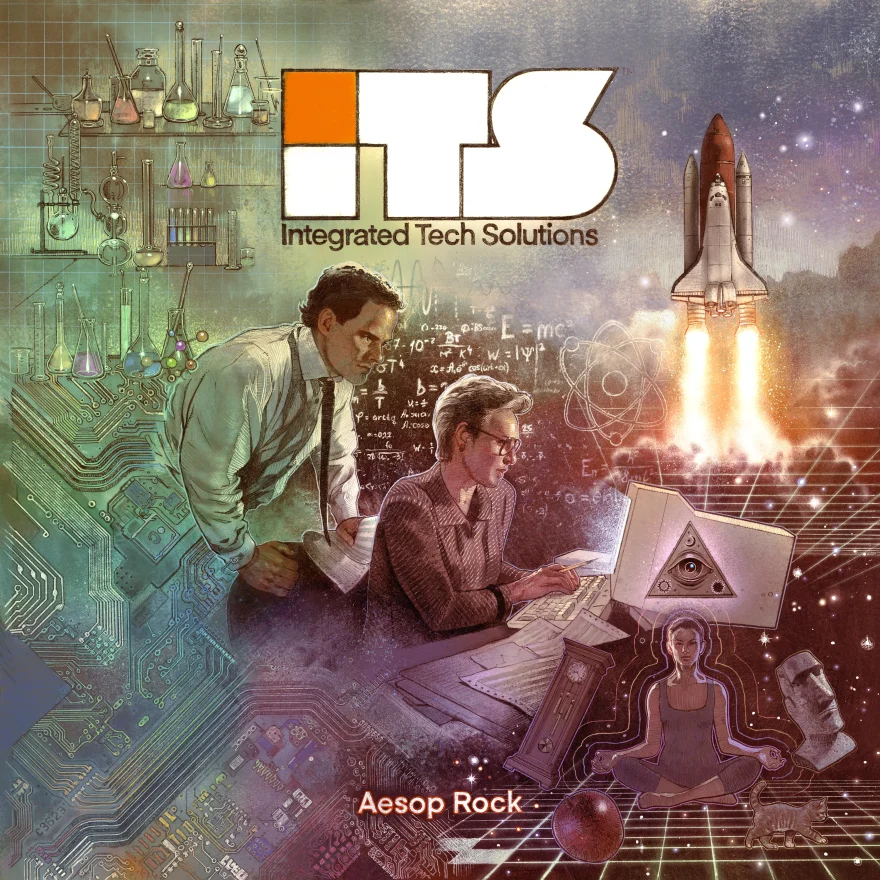Every year we fall over ourselves in a blitz to the new iPhone and fork over for the latest FIFA retread, but every year we also get passed up for that promotion while another kid in Africa mines for your cobalt (or whatever). Sure, our everyday products are a wonder of invention and adversity in the face of necessity; but what do we lose of ourselves in that struggle and in the process of that creation? Thankfully, Aesop Rock is able to ask these questions with more tact on his new album Integrated Tech Solutions, where he examines his own relationship with the bourgeois and the misbegotten alike.
Even 25 years into his career as a backpack legend, Aesop Rock still finds ways to refine the formula. The 2001 classic Labor Days was his most conceptual album to date, granting voice to every dejected young man fed up with waiting tables – his being one of the first major generations either to challenge, or flat out unable to attain, the American dream and nuclear family at a national level. These same issues are only amplified today, and Aesop focuses on them so heavily for the first time since Labor Days – albeit with a more level head and nuanced songwriting.
Structurally, Integrated Tech Solutions is reminiscent of Aes’ last solo effort, 2020’s Spirit World Field Guide. On first listen, it might seem that these projects lose sight of their concept and meander after the first couple tracks, but ITS is able to tightly intertwine many ideas across its hour-plus runtime. Musically, ITS couldn’t be more different from Spirit World Field Guide; while the latter was lauded as some of Aes’ best production to date, ITS reels it in to much more mellow and traditionally boombappy sounds. Impressively, he is capable of much more than the Def Jux bombast of his past, likely taking queues from Blockhead after 2021’s Garbology.
Aesop Rock – Kyanite Toothpick (feat. Hanni El Khatib)
The first single for ITS, “Modern Solutionism” , is its most direct examination of our relationship with technology, wherein it might amaze, simplify the mundane, or even inflict the worst of suffering. From there on, however, Aesop seemingly rambles on about food, nature, and drops his most vivid vignettes ever (incredible, that a lyricist of his caliber is still growing as a storyteller). His underlying attitudes towards the marginalized man, structural shortcomings, and the artistic struggles of the day always leer at the bleak, materialist future Aes theorizes.
The thesis of Integrated Tech Solutions lies most comprehensively in the quirky “Pigeonometry”. In a likely callback to Cannibal Ox’s classic “Pigeon“, Aesop builds on their metaphor for the pests as every city indignant by drawing parallels between invention and artistry – that every creator follows the same process of a search for inspiration and grapples with obstacles both internal and societal. Or is it that the inventor is obsoleting the artist; that growingly striated classes and materialism actually set back society on a moral level in spite of the measurable growth?
There isn’t a condition, complication, or a vision
Where the answer ain’t to build a more sophisticated widget
Drawing comparisons between himself and a legendary figure such as Da Vinci leads Aesop Rock to over ambition, losing sight of his passion in favor of something too wide in scope and impersonal – the very same way we overlook countless critical stories from our own people. A figure Aes holds in similar regard cameos on “100 Feet Tall“; as he recounts the story of briefly meeting Mr. T as a kid, Aesop (in a manner so lighthearted only he could achieve) hints at the way media and the “black mirror” obscure our perceptions of certain people. Mr. T was a superhero role model to kids everywhere, a larger than life figure, who just wants a sandwich like everyone else.
On the subject of commodification and consumption, Aesop of course equates success to fine eats on “Salt and Pepper Squid” and “Time Moves Differently Here” in his obligatory food records. On one track, he might be recounting a traumatizing, yet guild inducing encounter with a homeless oddball (“Aggressive Steven“), and on the next, escape it all in a beautiful tribute to nature (“By the River“).

Aes even tackles the loss of his grandmother, some of his most straightforward and honest work since “The Impossible Kid“. His ever eclectic nature turns out to be a subtle and significant strength in his mission statement, rather than what might be perceived as unfocused coming from a less talented MC. Also notable is the inclusion of rap features from billy woods (“Might as well be feeding the rats, but the rats already well-fed”) and Rob Sonic (“The baggage was too heavy so instead he headed back in time”), both frequent and challenging collaborators who surely have more to say with Aesop on the way.
Aesop continues not only these themes, but also with the unorthodox songwriting on “On Failure“. Musing in free verse on the legacy and works of Vincent Van Gogh, he questions how the complex stories of any man, whether beautiful or tragic, are remembered – that is, if they’re remembered at all. Van Gogh was of little wider value in his life, yet his pretty little trinkets are priceless today. Where will that leave Aesop Rock in a hundred years? Will we still care about paintings or hip-hop at all come that time? Where will that leave you? Don’t let the algorithm decide.

